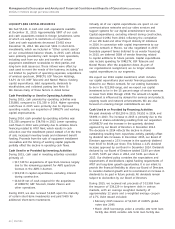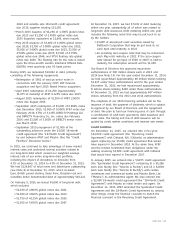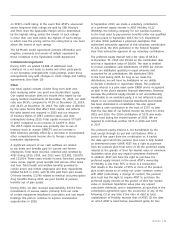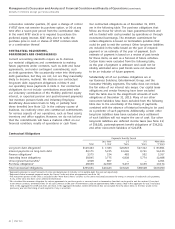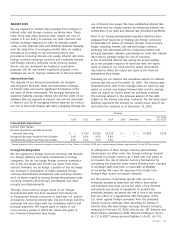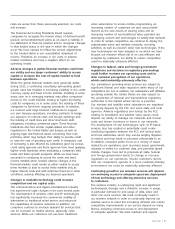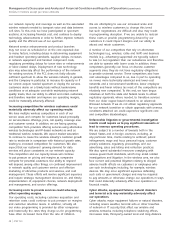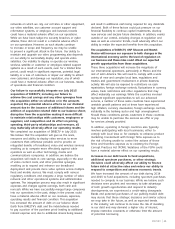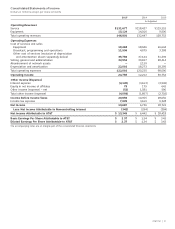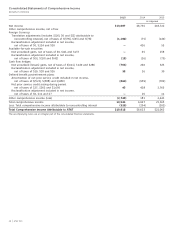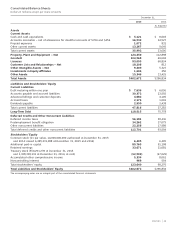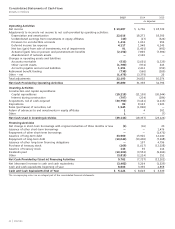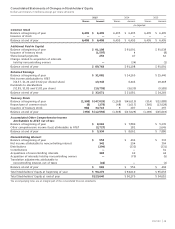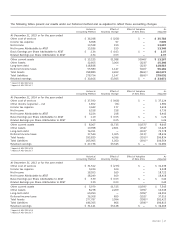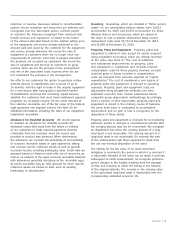AT&T Wireless 2015 Annual Report Download - page 41
Download and view the complete annual report
Please find page 41 of the 2015 AT&T Wireless annual report below. You can navigate through the pages in the report by either clicking on the pages listed below, or by using the keyword search tool below to find specific information within the annual report.
AT&T INC.
|
39
will result in additional cash being required for any dividends
declared. Both of these factors could put pressure on our
financial flexibility to continue capital investments, develop
new services and declare future dividends. In addition, events
outside of our control, including changes in regulation and
laws as well as economic trends, could adversely affect our
ability to realize the expected benefits from this acquisition.
The acquisitions of DIRECTV, GSF Telecom and Nextel
Mexico will increase our exposure to both changes in the
international economy and to the level of regulation on
our business and these risks could offset our expected
growth opportunities from these acquisitions.
These three acquisitions will increase the magnitude of
our international operations, particularly in Mexico and the
rest of Latin America. We will need to comply with a wide
variety of new and complex local laws, regulations and
treaties and government involvement in private business
activity. We will also be exposed to restrictions on cash
repatriation, foreign exchange controls, fluctuations in currency
values, trade restrictions and other regulations that may
affect materially our earnings. While the countries involved
represent significant opportunities to sell our advanced
services, a number of these same countries have experienced
unstable growth patterns and at times have experienced
high inflation, currency devaluation, foreign exchange controls,
instability in the banking sector and high unemployment.
Should these conditions persist, customers in these countries
may be unable to purchase the services we offer or pay
for services already provided.
In addition, operating in foreign countries also typically
involves participating with local businesses, either to
comply with local laws or, for example, to enhance product
marketing. Involvement with foreign firms exposes us to
the risk of being unable to control the actions of those
firms and therefore exposes us to violating the Foreign
Corrupt Practices Act (FCPA). Violations of the FCPA could
have a material adverse effect on our operating results.
Increases in our debt levels to fund acquisitions,
additional spectrum purchases, or other strategic
decisions could adversely affect our ability to finance
future debt at attractive rates and reduce our ability to
respond to competition and adverse economic trends.
We have increased the amount of our debt during 2014
and 2015 to fund acquisitions, including spectrum purchases
needed to compete in our business. While we believe such
decisions were prudent and necessary to take advantage
of both growth opportunities and respond to industry
developments, we experienced a credit-rating downgrade.
Banks and potential purchasers of our publicly-traded debt
may decide that these strategic decisions and similar actions
we may take in the future, as well as expected trends
in the industry, will continue to increase the risk of investing
in our debt and may demand a higher rate of interest,
impose restrictive covenants or otherwise limit the amount
of potential borrowing.
networks on which we rely, our cell sites or other equipment,
our video satellites, our customer account support and
information systems, or employee and business records
could have a material adverse effect on our operations.
While we have been subject to security breaches or cyber
attacks, these did not result in a material adverse effect
on our operations. However, as such attacks continue
to increase in scope and frequency, we may be unable
to prevent a significant attack in the future. Our ability to
maintain and upgrade our video programming also depends
on our ability to successfully deploy and operate video
satellites. Our inability to deploy or operate our wireline,
wireless, satellite or customer or employee-related support
systems as a result of such events, even for a limited time
period, could result in significant expenses, potential legal
liability or a loss of customers or impair our ability to attract
new customers, and damage our reputation, any of which
could have a material adverse effect on our business, results
of operations and financial condition.
Our failure to successfully integrate our July 2015
acquisition of DIRECTV, including our failure to
achieve the cost savings and any other synergies from
the acquisition either on schedule or in the amounts
expected; the potential adverse effects on our dividend
amount due to the issuance of additional shares and the
addition of acquisition-related debt to our balance sheet;
disruption from the acquisition making it more difficult
to maintain relationships with customers, employees or
suppliers; and competition and its effect on pricing,
spending, third-party relationships and revenues, all
may materially adversely affect our operating results.
We completed our acquisition of DIRECTV in July 2015.
We believe that the acquisition will give us the scale,
resources and ability to deploy video services to more
customers than otherwise possible and to provide an
integrated bundle of broadband, video and wireless services
enabling us to compete more effectively against cable
operators as well as other technology, media and
communications companies. In addition, we believe the
acquisition will result in cost savings, especially in the area
of video content costs, and other potential synergies,
enabling us to expand and enhance our broadband
deployment and provide more video options across multiple
fixed and mobile devices. We must comply with various
regulatory conditions and integrate a large number of video
network and other operational systems and administrative
systems. The integration process may also result in significant
expenses and charges against earnings, both cash and
noncash. While we have successfully merged large companies
into our operations in the past, delays in the process could
have a material adverse effect on our revenues, expenses,
operating results and financial condition. This acquisition
has increased the amount of debt on our balance sheet
(both from DIRECTV’s debt and the indebtedness needed
to pay a portion of the purchase price) leading to additional
interest expense and, due to additional shares being issued,



